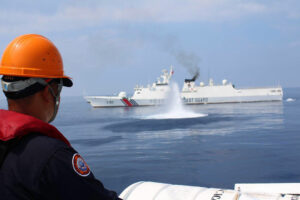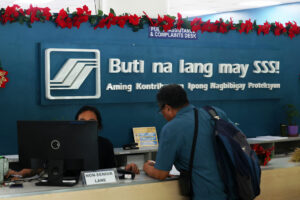By Kyle Aristophere T. Atienza and Chloe Mari A. Hufana, Reporters
PRESIDENT Ferdinand R. Marcos, Jr.’s move to reorganize the National Security Council (NSC), which saw the removal of Vice-President Sara Z. Duterte-Carpio and former presidents, is seen as necessary, security analysts said, noting this may be driven by geopolitical factors, particularly the Philippines’ increasingly complex relationship with China.
Mr. Marcos struck a balance between having more views at the table and trimming down the number of people who can access intelligence information due to a foreign aggressor that is likely working with local elites, said Joshua Bernard B. Espeña, who teaches international relations at the Polytechnic University of the Philippines.
He was referring to China, which claims the South China Sea almost in its entirety including waters within the Philippines’ exclusive economic zone (EEZ).
“We consider the streamlining of views filtered by the chief executive. The fewer voices, the quicker one can decide especially in times of crisis management,” he said in a Facebook Messenger.
On Jan. 4, Chinese Coast Guard’s ship dubbed “The Monster” brought its “intrusive patrol even further east from Scarborough Shoal.”
“It is now asserting China’s claim of jurisdiction just 50 nautical miles from the Philippines’ main island of Luzon,” Raymond M. Powell, a fellow at Stanford University’s Gordian Knot Center for National Security Innovation, posted on his X (formerly Twitter) account.
“The Monster” weighs 12,000 tons, 5 times more than the Philippine Coast Guard’s two largest ships, according to Mr. Powell.
The Chinese Embassy in Manila did not immediately respond to a Viber message seeking comment.
This followed the discovery of a suspected submersible drone from China in the central Philippines as the new year started.
The Philippine Navy is currently conducting its investigation to determine the origin and purpose of the sea drone, Xerxes A. Trinidad, chief of the Armed Forces of the Philippines Public Affairs Office, said in a statement last week.
Executive Order (EO) No. 81 reorganized the NSC by removing past presidents and the vice-president as members, citing the need to streamline its composition.
But Mr. Espeña said having past presidents at the table may also enable the government to have “historical insights” into security matters.
“The more views at the table, the deeper insights the chief executive can have on national security decision-making, especially in making and executing a grand strategy,” he said.
“The point is to strike a balance especially if certain views of the vice-president and former presidents are advantageous for national security interests,” he explained.
Mr. Espeña said Mr. Marcos “made a good decision” in trimming down the intelligence cycle “to deter pro-Chinese views in the official lines of communication at the trade-off against diversity of views.”
Mr. Espeña said the president, still, can invite and gather insights from former presidents despite their removal from the NSC.
“But I suspect that the incumbent government wants to keep the intelligence cycle as tight as possible since a devil’s advocate is not tantamount to one with treacherous views.”
Executive Secretary Lucas P. Bersamin at the weekend clarified that “at the moment, the vice-president is not considered relevant to the responsibilities of membership in the NSC.”
“Nonetheless, when the need arises, the EO reserves to the President the power to add members or advisers,” he added in a statement.
The NSC, which was established in 1950, said the reorganization was a response to the changing times, citing the need “to further enhance the formulation of policies affecting national security.”
“The NSC is, first and foremost, an advisory body to the President, and its composition is always subject to the authority of President,” National Security Advisor Eduardo M. Año said in a statement.
He noted that previous presidents such as Ferdinand E. Marcos, Sr., Corazon C. Aquino, Fidel V. Ramos, and Gloria Macapagal-Arroyo reorganized the composition of the NSC to meet the President’s requirements and changing conditions.
“Hence, the purpose of reorganization is to enhance the formulation of policies relating to national security so that actions and decisions thereon by the Presidents rests on sound advice and accurate information,” he said.
“It is also premised on the need for timely and coherent action to address current and emerging threats to national security,” he added.
Chester B. Cabalza, founder and president of the Manila-based think tank International Development and Security Cooperation, said the pragmatism of the move “boils down to the rationale that not all past presidents and vice-president are knowledgeable of national security.”
“Trust is very important in the community of defense and security,” he said.
Mr. Cabalza earlier told BusinessWorld that China may support politicians in their political campaigns amid growing tensions in the South China Sea.
Chinese intrusions into Philippine waters have prompted Manila to gradually shift to an external security orientation, launching the Comprehensive Archipelagic Defense Concept (CADC) last year to put focus on the country’s maritime zones.
Josue Raphael J. Cortez, a diplomacy instructor at the De La Salle-College of St. Benilde’s School of Diplomacy and Governance, said the president’s move may be due to the Duterte family’s alliance with the Chinese government.
“In cognizance with the continuous militarization of the disputed territories, the Chief Executive might be wary of engaging the VP in discussions pertinent to the matter,” he said in a Messenger chat.
Ms. Duterte’s father, former President Rodrigo R. Duterte, notably pursued closer ties with Beijing during his term from 2016 to 2022, softening Manila’s stance on the South China Sea disputes and securing billions in pledges for loans and investments.
Mr. Cortez added the vice-president’s removal may also reflect the “nuances in today’s security landscape” as other government personnel or agencies, and private people, may be appointed members of the NSC.
“Given that security challenges today are not merely state-centric anymore and now involve nonstate actors, then hearing their perspectives in the body is undoubtedly vital,” he said.
Ms. Duterte’s removal can also be due to the soured relationship with Mr. Marcos, he said, which saw a once formidable alliance that led to their 2022 victory devolve into political tension.
From a global perspective, the move would not have a direct effect on Manila’s international partnerships, he added.
“However, of course, we need to be pragmatic enough that the Chinese Communist Party and China as a whole may view this as a propaganda geared towards ensuring that pro-China people in the public sector are being undermined in light of our tensions with them.
POLITICALLY MOTIVATEDAteneo Policy Center fellow Michael Henry Ll. Yusingco, on the other hand, said the move reeks of partisanship.
“National security should be beyond partisan politics. But every president has failed to de-politicize national security,” he said in a Messenger chat.
“The President certainly has the authority to reorganize the NSC but never for partisan reasons. In fact, there can only be one reason for a public official or any person for that matter to be excluded from the NSC,” he added.
Mr. Marcos needs to prove that the vice-president “is a verified threat to our national security,” Mr. Yusingco said.
“The only way for the Pre(sident) to convince the public that this was not a partisan political move is for him to demonstrate that the VP is a national security threat,” he explained.
“No other rationale will make this move reasonable or appropriate,” he added. “Simply asserting his authority to do reorganize the NSC just reinforces the suspicion that the exclusion of the VP is politically motivated.”
Former Bayan Muna Rep. Neri J. Colmenares said the move to reorganize the NSC “reflects the intensifying power struggle between the country’s dominant political dynasties ahead of the mid-term elections.”
“This is not just about national security — this is about political survival,” he said in a statement.
He said the NSC reorganization might signal deeper problems within the administration.
“Their removal may also indicate fears of a possible rift within the military establishment, which could have serious implications for the country’s stability.”
Ms. Duterte’s expulsion from the NSC further diminished her role in Mr. Marcos’ government, as she had previously resigned from the presidential Cabinet, leaving her education minister post and deputy leadership of the country’s anti-insurgency task force.
Hansley A. Juliano, who teaches political science at the Ateneo, while the NSC reorganization may make sense in the long run in terms of the President’s security policy, it may set a bad precedent for making security issues a bipartisan concern.
“Foreign policy is institutionally a bipartisan concern: the expectation is that foreign affairs need to remain stable/consistent even when regimes change,” he said via Messenger chat.
“It’s what is good for business and labor migration after all.”
Under the new EO, NSC members are the Senate President; Speaker of the House of Representatives; Senate President Pro-Tempore; Three Deputy Speakers to be designated by the Speaker; Majority Floor Leader of the Senate; Majority Floor Leader of the House; Minority Floor Leader of the Senate; Minority Floor Leader of the House; Chairpersons of the Senate Committee on Foreign Relations, Senate Committee on National Defense and Security, Peace, Unification and Reconciliation, and Senate Committee on Public Order and Dangerous Drugs.
Also part of the council are the chairpersons of House Committee on Foreign Affairs, House Committee on National Defense and Security, House Committee on Public Order and Safety; Executive Secretary; National Security Adviser; Secretaries of Department of Foreign Affairs, Department of Justice, Department of National Defense, Department of the Interior and Local Government, Department of Labor and Employment, Presidential Communications Office; Chief Presidential Legal Counsel; Head of the Presidential Legislative Liaison Office; and other government officials and private citizens appointed by the President.
The Director-General of the National Intelligence Coordinating Agency (NICA), the Chief of Staff of the Armed Forces of the Philippines (AFP), the Chief of the Philippine National Police (PNP), and the Director of the National Bureau of Investigation (NBI) shall attend the meetings of the council “as may be necessary to advise and assist in its deliberations,” Malacañang said.
The Governor of the Bangko Sentral ng Pilipinas (BSP) may also be invited to participate in the NSC, it added.
The NSC’s executive committee is now composed of the President as chairperson, with members composed of the Executive Secretary, Senate President or his representative, Speaker of the House of Representatives or his representative, National Security Adviser, the secretaries of the Department of Foreign Affairs, Department of Justice, Department of National Defense, Department of the Interior and Local Government, and other members or advisers designated by the President. — with a report from Kenneth Christiane L. Basilio






